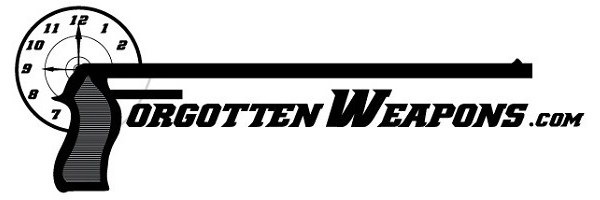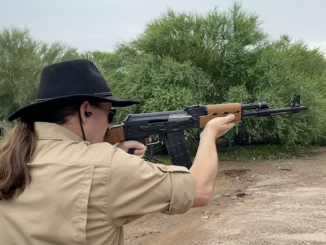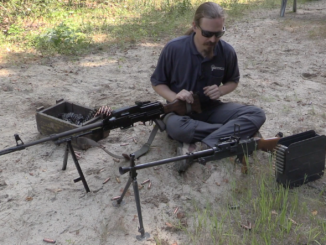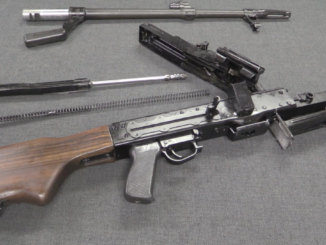Shortly after the end of World War Two, Yugoslavia adopted a submachine gun that looked very much like the Soviet PPSh-41, and was obviously inspired by it. However, the manufacturing methods were completely different, with the Yugoslav gun being of all milled construction and with internal parts far more similar to the Beretta 38 family of SMGs than to the PPSh. In fact, the original Yugoslav M49 used a captive recoil spring like the Beretta 38, which was simplified in the M49/57 variation just as is was simplified by Beretta during WW2.
The controls are similar to the PPSh, particularly the fire selector lever and the magazine release, which are basically identical in both guns. The Yugo uses a push-button safety in place of the PPSh’s bolt-mounted safety, and the disassembly procedure is entirely different because of the different construction technique.
The M49 and M49/57 were offered for export sale in both 7.62mm Tokarev and 9mm Parabellum, but I was not able to find evidence of any substantial sales. The gun was ultimately replaced in Yugoslav service by the M56 submachine gun – a gun with an interesting similarity to the German MP40.
Thanks to Marstar for letting me examine their M49/57!




Milled parts are easier to make in one respect: not every town has the equipment required for stamping. Lathes and traditional machining equipment are easier to get and easier to operate/maintain than a stamping press. I could be wrong.
Most actual garages as opposed to “service stations” will have at last one lathe, even today. And Yugoslavia always had a lot of “cottage industry” machinists, etc., due to its being mostly rural other than the Adriatic coastal areas.
Also, Yugoslavia’s armaments industry had largely been set up under Alexander I just before and immediately after WW1- first by DWM in Germany, and then by CZ in Czechoslovakia. Three guesses what sort of production facilities they had as a result. Hint; the Yugoslav Model 24 Mauser was essentially the Vz 24.
Plus, after WW2, Tito was determined to keep his independence from Moscow, even if he was a communist. So, the last thing he would have wanted was a lot of Russian “economic advisors” coming in to revamp his armaments industry along Soviet lines.
Put it all together, and the Yugoslav Army’s preference for domestic arms manufactured along fundamentally German and/or Italian lines isn’t really all that surprising.
Incidentally, according to the book The Balkans on Fire by Yves Debay et al;
https://www.amazon.com/Balkans-Fire-Nightmare-Yugoslavia-Concord/dp/9623617127
Both the original M49 and the M49/57 were used extensively by all sides in the Kosovo War, as was the later M56, not to mention any arms that could be scraped up anywhere. Even Lewis guns in 0.303in or 6.5 x 53R Mannlicher left over from the Greek Civil War of 1945-49.
cheers
eon
With shooting it Ian is probably referring to this video, which has been uploaded on March 2nd 2018:
https://www.youtube.com/watch?v=SlT08lJpQ48
Ian, Beretta link is even more obvious in the first model of SMG Zastava made – M45. It was in 9×19 and combined Beretta bolt with Erma EMP-35 trigger group.
https://78.media.tumblr.com/0b533067b76e6f59b202d549106929ea/tumblr_ol4gt24r6C1sfltapo1_1280.jpg
And a pic of the original M49
http://i64.tinypic.com/2hnsyle.jpg
Among Territorial Defense in the 1970s, unmodified M49:
http://i65.tinypic.com/35jxj09.jpg
There was only one problem with m49/57, and it was magazine. It’s near to impossible to load it without proper loader. On the other side, it’s reliable, accurate weapon. In a matter of fact, as a weapon of war, it’s probably the best SMG I’ve ever used. And I tried tens of different SMGs.
I have one of these. Actualily it is a 49/57 parts kit mated with a registered Stemle tube. Except fo markings it Is exact. Fires rapidly consuming a lot of Tokarev amm
Which drum magazines have double feed? It sounds bizarre.
“drum magazines have double feed”
What about PPD-34/38: https://www.5rar.asn.au/weapons/ppd34.htm
Yugo M24 Mausers were not vz.24. they were FN based. Some quantity of the vz.24 was however used.
The one I have seen is not milled, it is stamped. And photos in internet, some show that it is stamped. It is stamped, then rolled, to form a tube, and welded. The weld is on the right. It is obvious, if you look from the inside. It is well done and it does not show from the outside, because it is very well grinded. On the one I have seen, the holes at the front part (on the right), did not align so well, ending been oval in shape. I believe, since it is done with care, the outcome, mechanically, is identical.
George